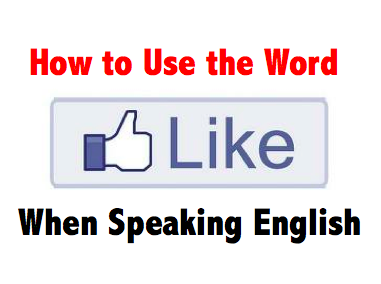Learn English

As a noun
As a verb
Would like
As a preposition
As a conjunction
Feel like
As an adverbial
As a quotative
- Day 15
...
- The Infinitive
Non ? Finite VerbsThe infinitive The participial The gerund These three verbs are called non finite verbs, and there is no any kind of limitation to use these verbs like ..,according to subject, number or person. unlike any other verbs that...
- Beethoven
MAHARANI KHANSA - 120221414982 [ Diamond Shape ] Beethovenwas agreat musician. ...
- Beethoven
Septian Tri Jayanti (120221414996) Beethoven?s composition did not come easily. It is hard to make him satisfied with his work. When he was 28, he gradually became deaf and got stress. However, he could gain his bravely and started to compose again....
- Uses Of Different Forms Of Verbs
Uses of Different Forms of Verbs We now know that Verb has six forms: 1. Present Form 2. Past Form ...
Learn English
Different uses and meanings of "Like" / How to use it?
The word "like" has different uses and meanings. It can be a noun, verb, adverb, preposition, conjunction, and quotative. So, here is a clear explanation how to use it.

As a noun
As a noun like has the following meanings:- A person, thing or group similar to the one mentioned. (e.g. She was a great woman; we won't see her like.)
- The things that someone enjoys. (e.g. Swimming is one of my likes.)
As a verb
The verb like means:- I like dancing.
- I like to be honest.
These two forms often have the same meaning, but sometimes there is a difference.- When we use like with an infinitive, it expresses habitual preference, something that the speaker does not necessarily like or enjoy but considers as useful, right or wise ( e.g. I like to see my doctor once a year.)
- When like is used with the gerund form, the construction tends to mean that we are actually doing the action (e.g. I like listening to music.)
Would like
Would like is used to make polite offers and requests.- Would you like some tea?
- I'd like to see your report.
As a preposition
The word like may be used as a preposition; it can introduce a simile (a stylistic device comparing two dissimilar ideas) as well as non-simile comparisons.- He fights like a lion.
- He swims like fast as a fish.
- He has a car just like hers
As a conjunction
The word like may replace the subordinating conjunction as or as if. (Some people think it is 'incorrect' but you will certainly hear it a lot.)- I feel like I am a star.
- They look like they have been having fun.
Feel like
Feel like can be used in two different ways:- Informally, feel like means to have an inclination or desire for. (e.g. I felt like watching a movie)
- feel like (oneself) means to sense oneself as being in one's normal state of health or spirits. (e.g. I just don't feel like myself today
As an adverbial
Colloquially, like may be used as an adverb in the construction:- He was like to do it again
- He was like to start all over again.
As a quotative
Like is sometimes used colloquially as a quotative (an expression, such as she said or he goes, that introduces reported speech) to introduce a quotation or impersonation.- He was like, "I'll be back in five minutes."
- She was like, "go out!"
- I was like [speaker rolls eyes].
- The car was like, "vroom!"
- Day 15
...
- The Infinitive
Non ? Finite VerbsThe infinitive The participial The gerund These three verbs are called non finite verbs, and there is no any kind of limitation to use these verbs like ..,according to subject, number or person. unlike any other verbs that...
- Beethoven
MAHARANI KHANSA - 120221414982 [ Diamond Shape ] Beethovenwas agreat musician. ...
- Beethoven
Septian Tri Jayanti (120221414996) Beethoven?s composition did not come easily. It is hard to make him satisfied with his work. When he was 28, he gradually became deaf and got stress. However, he could gain his bravely and started to compose again....
- Uses Of Different Forms Of Verbs
Uses of Different Forms of Verbs We now know that Verb has six forms: 1. Present Form 2. Past Form ...
